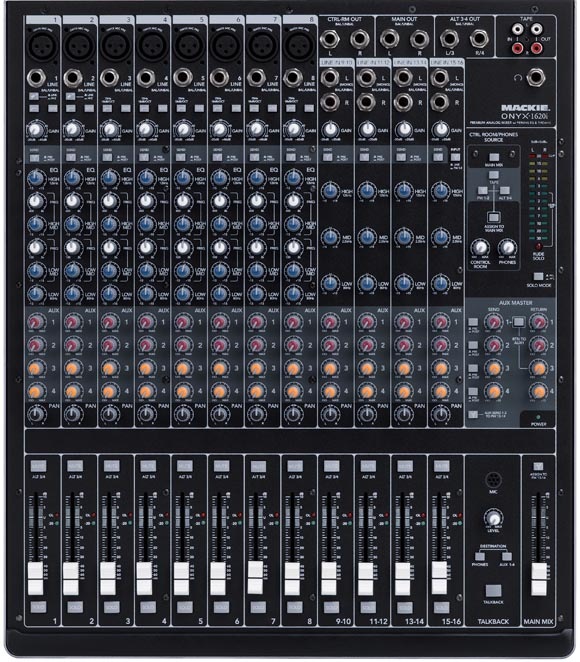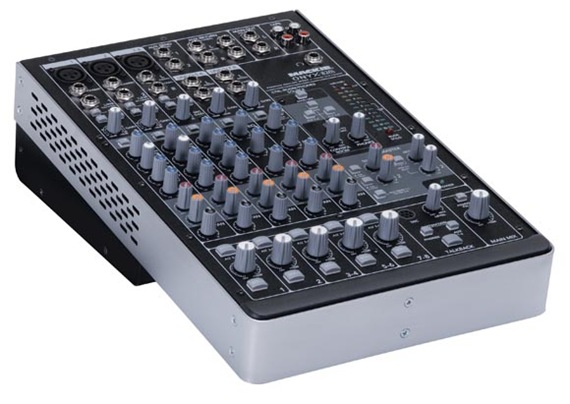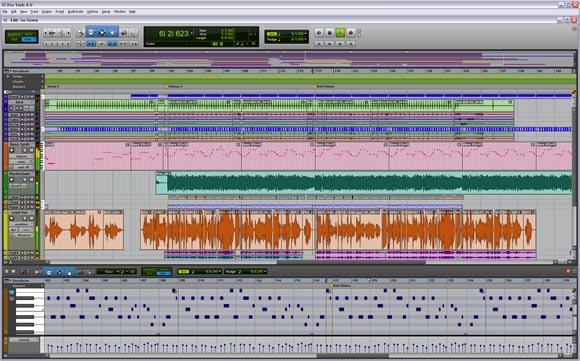It’s been one of the few constants in music technology. To use Pro Tools software, you need Pro Tools hardware – that means M-Audio interfaces for M-Powered (and now Essentials) and Digidesign interfaces for LE and HD. Without M-Audio or Digidesign hardware actively plugged in, the software refuses to run. And there’s no way for a third party to get their audio hardware working with the software.
Or so everyone thought. Without the cooperation of Avid, Mackie says they have managed to get their Onyx-i mixer line working with Pro Tools, and they’ll even “certify” compatibility. At the end of July, a number of audio sites (including Mix and Sonic State, but not CDM) received a package with one of Mackie’s new mixers, a video, and a copy of Pro Tools M-Powered. The message: a “secret” driver provided compatibility between Mackie’s mixer-audio interface package and Pro Tools. (See Sonic State’s writeup.)
So, what’s going on?
Onyx-i – What’s “i”mproved
Before I get into that, first, a word about Mackie’s new Onyx-i mixers. Viral videos aside, I already know many CDM readers don’t actually like Pro Tools, and the Onyx-i has plenty of other features to recommend it. The original Onyx was already an interesting solution, with the potential to combine a full-blown Mackie mixer with a FireWire audio interface. But the hardware was bulky, and adding FireWire support required buying and installing a separate add-in card.
The Onyx-i solves both problems. The entry-level Onyx 820i model adds a compact, inexpensive (street just US$500) 8-channel by 2-channel output option. Also, all of the new Onyx line (up to the 16×16 1640i) have FireWire built-in – no expansion needed. The line still has a rather hefty bulge that sits below the mixers, but at least with the addition of the 820i, there’s an option I could imagine throwing in a backpack. (That’s good news, I think there are more scenarios where you might want simple mixing than need to lug around a 16×16 mixer-interface.) The cheaper Onyx-i models are also competition for the Cakewalk VS-100 I reviewed recently. The Onyx lacks the VS control surface, flash recorder, and the Cakewalk software bundle, but if you were more interested in the mixer to begin with, the Onyx series could be worth a look.
At the high end, the 1640i can stream full 16 x 16 audio channels in and out of your DAW.

The Onyx also makes “universal” compatibility a selling point, and that’s where this Pro Tools saga comes in. The Onyx-i is “qualified for use with all major DAWs,” including Logic, SONAR, Cubase, Ableton Live, and … Pro Tools M-Powered 8. Of course, the last entry was assumed to be technically impossible, and Avid has, to my knowledge, never been compatible with any hardware other than their own. (The only exception I can recall is the brief availability of something called Pro Tools FREE, which worked with standard audio drivers and cost nothing, though it had a number of other limitations.)
Mackie’s announcement came with this disclaimer:
The Onyx-i Series Mixers are qualified by Mackie for use with Pro Tools® M-Powered™ 8. Mackie will release a driver (via www.mackie.com) together with full details of how to use the Onyx-i series with Pro Tools® M-Powered™ 8 in the coming weeks.
Avid has declined to comment for the time being on the Onyx-i compatibility claim, though they at least confirmed that they were not involved.
Shaunna Thompson of Mackie emphasized to CDM that there was “no reverse engineering” involved in creating the Onyx-i driver for Pro Tools M-Powered, and that they were “in discussions” with Avid but could not comment further on those discussions or how Avid would respond.
Conventional wisdom about Avid and Pro Tools has been that hardware “lock-in” – the reliance on their hardware – is good for their business. That may well be, and I do believe in hardware choice; it’s part of why Pro Tools hasn’t ever been my main DAW. I do have to point out, though, that every other audio software maker, from big developers to people maintaining open source software, will tell you compatibility is a huge pain. Massive amounts of time get spent on testing and compatibility, particularly when you start combining different operating systems and different combinations of hardware and drivers. So there’s no question that the other thing Avid has been able to do is to reduce some of that complexity, some of the additional sources of support problems, and all the costs associated with both.
But that made me all the more curious about just how the Onyx-i support works.
Q&A with Mackie
CDM: Can you comment on the inclusion of Pro Tools M-Powered?
Mackie: The “Ransom Packages” that were sent out as part of a viral campaign included a copy of Pro Tools® M -Powered™ 8. However, the mixers do not come with a copy of Pro Tools; users will need to purchase this separately.
CDM: I’m sure you can’t talk about all the details, but is there anything you can say about how the M-Powered support was reverse-engineered?
Mackie: Mackie did not ‘reverse engineer’ support for Pro Tools M-Powered 8. We created a custom universal driver that enables use with all major DAWs including Pro Tools® M -Powered™ 8.
CDM: For that matter, at the risk of asking the obvious, why would Mackie want to support Pro Tools given support for other hosts and your own DAW (Tracktion)?
Mackie: The Onyx-i Series interfaces with all major DAW’s including Pro Tools® M -Powered™ 8 and our very own Tracktion Software. Our customers have been telling us for years that they want a mixer that can interface with Pro Tools® – we are simply giving our customers what they want.
CDM: Aside from the Pro Tools questions, I’m a little unclear – what’s new in the "-i" versus the original Onyx predecessors?
Mackie: The biggest difference is that the Onyx-i Series has deep FireWire integration. Now you don’t have to buy a separate FireWire card because it’s already built into the mixer offering a significant increase in performance and value over the older Onyx Compact Series. This effectively means you get a premium analog mixer AND an ultra-high quality digital interface. These are the tools you need for serious computer recording.
Every channel on the mixers can be routed pre- or post- EQ to the computer, allowing the user to choose whether to implement EQ to tape or not. Returns from you computer can be routed back through the channel strip for integration into the mix or for mastering the Perkins EQ.
So, Does it Matter?
It seems that if this had happened a few years ago, it might have been explosive news, which is not the sense I got with Mackie’s attempt to “go viral” with that guy, his little dog, and his pantyhose mask. Then again, I’d better not speak too soon, lest I wind up with 100 comments on this post…
For many users, people who want hardware choice may already have found DAWs with which they’re happy. Pro Tools has its loyal users, and people make great music with it – it just happens that the same can be said of Ableton Live, Apple Logic, Reaper, and many others (just in descending order of recent reader interest on this site). And, of course, Mackie also makes their own Tracktion. Mackie actually risks overshadowing the other news here – the ability to buy a single piece of gear that’s both a Mackie mixer and a FireWire audio interface for under $500.
On the other hand, it’d be a fairly significant acheivement to release this driver, and perhaps even to get Avid’s support. And while I had to ask the question above, of course, Mackie wouldn’t do this if they weren’t getting customers bugging them for it. That’s why interoperability ultimately matters: users want certain choices, and (perhaps rightfully) don’t understand why they might be denied those choices.
I’m going to place the burden on Avid on this one, for one reason: Avid claims “interoperability” is one of their new corporate goals. It’s never been entirely clear what they mean. Some of that goal seems to have more to do with interoperability between products in their own product line. (In fairness, that seems a logical place to start!) So I hope whenever Avid and Mackie do finish their discussions, whatever Avid’s decision, we get clear communication for exactly what the “new” Avid’s interoperability goals are. If they feel they have a case for not supporting hardware like Mackie’s, that’s their prerogative. I’d just like to see clear communication from either company, to explain to their user base why they make those choices.
And, of course, I don’t expect that communication from either Mackie or Avid will come from anyone wearing a mask and a disguised voice.
I’ll be watching for the outcome of the discussions between these two industry giants. Stay tuned.

